Intel’s 14th-generation CPUs have arrived, building on the success of the 13th-generation Raptor Lake-based CPUs with improved clock speeds and, in some instances, increased core counts. On the other hand, AMD continues to hold its ground with its X3D CPU, which has proven to be a strong contender in the gaming arena. This makes the task of selecting the most suitable CPU for one’s PC quite a challenge.
The current CPU market offers an abundance of choices, with both Intel and AMD providing motherboards that are compatible with three and two different CPU generations respectively, assuming the X3D lineup is considered a separate CPU generation. This necessitates a more in-depth examination of what best suits one’s needs, which could range from general-purpose applications to gaming to intensive productivity tools. The key factors to consider when choosing a CPU based on performance include:
- Instructions Per Cycle (IPC)
- Clock Speeds
- Core Counts
- Memory & PCI-E Support
- Single Core Performance
- Efficiency/Power Consumption
- Cooling Requirements
For those seeking a balance between productivity and gaming, these top-tier CPUs are an excellent choice.
-
AMD Ryzen 7 8700G 8-Core, 16-Thread CPU: A Gaming and Productivity Powerhouse
Available for $329 at Best Buy
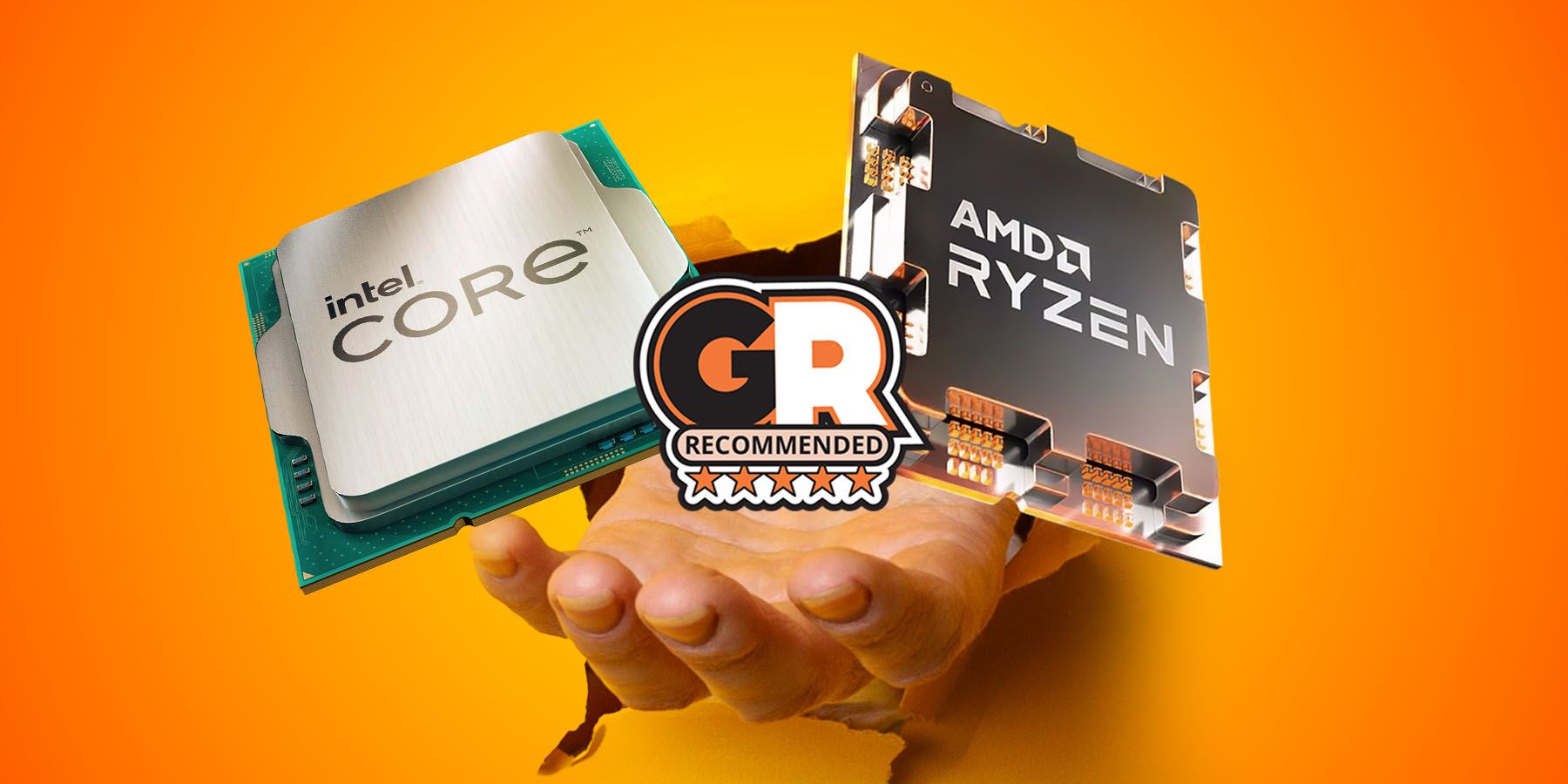
The Top Gaming CPUs to Consider in 2024
The gaming CPU market is becoming increasingly competitive. Here are the top contenders you should consider.
Our Top CPU Recommendations for 2024
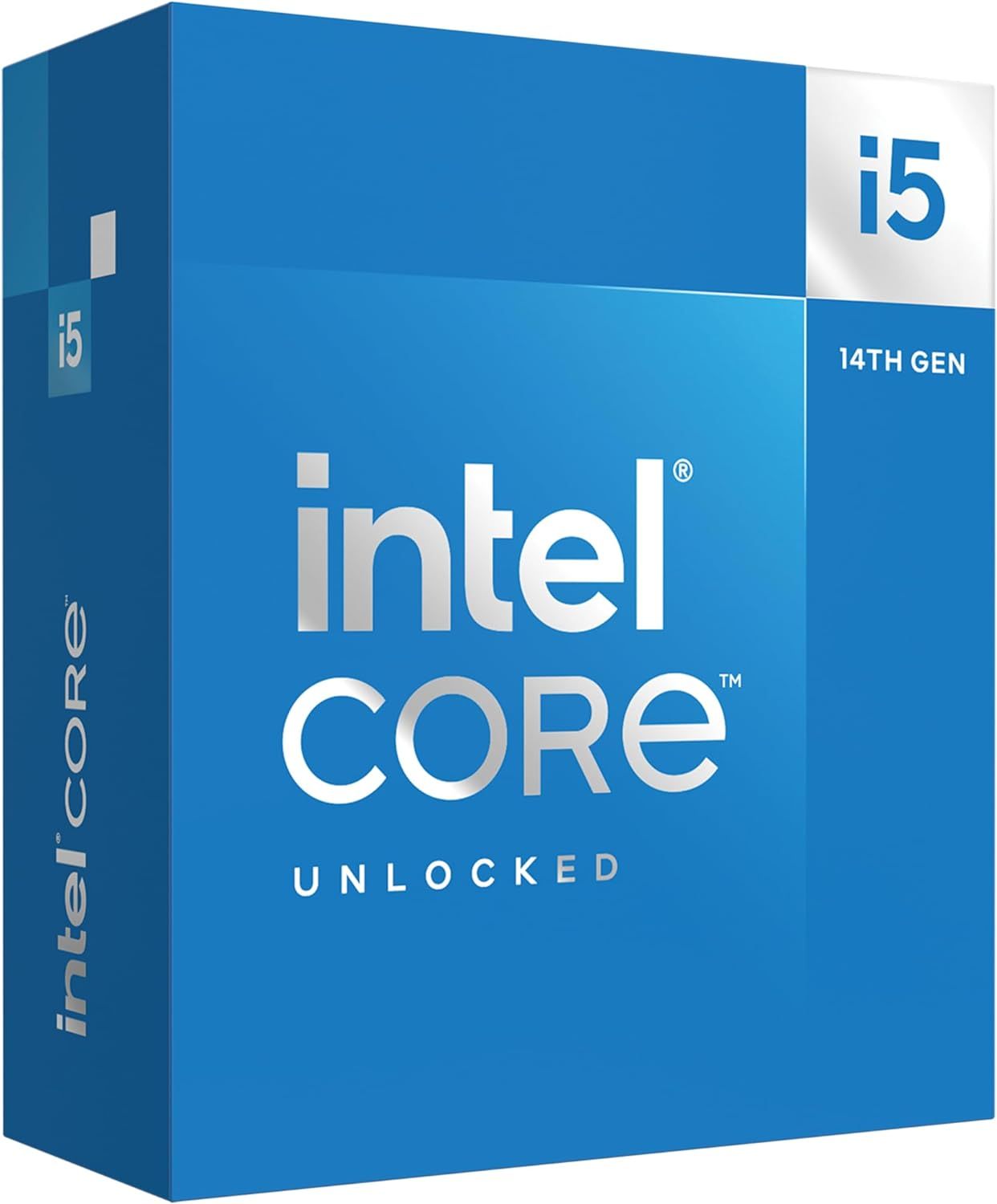
Intel Core i5 14600K 14-Core, 20-Thread CPU: The Best All-Rounder CPU
Available for $307 (originally $340) – Save $33
The Intel Core i5 14600K 14-Core, 20-Thread CPU is a robust mid-range CPU that supersedes the previous generation Intel Core i5 13600K with superior clock speeds on both its performance and efficiency cores.
Like its predecessors, it offers enhanced performance right out of the box but replaces them at the same price points they were sold at last year.
Key Features
- Brand: Intel
- CPU Model: Core i5 14600K
- CPU Socket: LGA 1700
- Cores: 14 (6P + 8E Cores)
- Threads: 20
- Architecture: Raptor Lake Refresh
- Process: Intel 7 (10 nm)
- Base Clock Speed: 3.5 GHz
- Boost Clock Speed: 5.3 GHz
- Cache: 20MB L2 + 24MB L3
- RAM: Up to 192GB DDR5 RAM
- PCIe: PCI-E 4.0/5.0 support
- Graphics: Intel UHD 770
- Power Draw: 181W (Turbo)
Pros
- Boasts an impressive 14 cores that can handle up to 20 threads simultaneously
- Provides slight gaming and productivity performance upgrades over its predecessor
- Comes with an entry-level integrated GPU
- Offers arguably the best value-for-money 14th-generation Intel CPU for gaming
Cons
- Has higher power and thermal requirements than its predecessor when under load
- Does not include a stock cooler as an unlocked CPU
Available at Amazon for $307, Newegg for $307, and Best Buy for $340.
Intel’s 14th Generation CPUs: A New Era of Performance
Intel’s 14th generation CPUs are a testament to the company’s commitment to innovation, building upon the success of the 13th generation with enhanced clock speeds, increased efficiency core counts (Core i7 14700K), and the integration of Intel’s APO scheduler optimizations (14700K and 14900K). Additionally, AI tuning has been introduced for the top-tier Intel CPUs (Core i9 14900K/KF). With AMD not releasing any new products in this segment since mid-2023, the 14600K is essentially competing against its predecessor, the Core i5 13600K, which may not be the most appealing prospect for users seeking an upgrade in 2024.
The Intel Core i5 14600K: A Standalone Powerhouse
Despite the competition, the Intel Core i5 14600K stands out as a robust product. It is unlocked right out of the box, allowing for easy overclocking (provided adequate cooling is in place), and boasts impressive gaming performance that surpasses AMD’s offerings at the $300 MSRP mark. Furthermore, its multicore performance is arguably superior, making it a versatile mid-range option for productivity tasks.
Value for Money: The Intel Core i5 14600K
One of the key advantages of the Intel Core i5 14600K is its price point. It maintains the same cost as the older 13600K while offering slightly improved performance. This makes the 14600K a logical, if not particularly exciting, upgrade for users looking to transition from their 12th generation or earlier Intel or AM4-based AMD CPUs to a newer model in 2024.
Opting for the Intel Core i5 14600KF
For users who already have, or are planning to get, a discrete GPU along with their CPU, the slightly cheaper Intel Core i5 14600KF could be a viable option. This CPU model eliminates the integrated GPU, resulting in a minor price reduction compared to the 14600K, while still offering the same performance class, clock speeds, and core counts.
Special Promotion: Free Copy of Star Wars Outlaws
Currently, both the Intel Core i5 14600K and the 14600KF are part of a promotional offer that includes a free copy of Star Wars Outlaws at launch with the purchase of any qualifying Intel 14th-generation CPU.
AMD Ryzen 7 7800X3D: A Worthy Competitor
Despite Intel’s impressive offerings, the AMD Ryzen 7 7800X3D stands as a formidable competitor. As AMD’s latest CPU, it offers exceptional gaming performance that currently tops the charts. Thanks to its 3D V-Cache-enabled capabilities, the Ryzen 7 7800X3D is a strong contender in the PC gaming market. This octa-core CPU is currently the fastest in the industry for gaming and also leads in efficiency, making it a highly desirable upgrade for gamers.
With a price drop from $449 to $269, the AMD Ryzen 7 7800X3D offers excellent value for money, providing the fastest gaming performance available in 2024 and being one of the most efficient processors for gaming, with a power consumption of just under 50W.
Unveiling the AMD Ryzen 7 7800X3D: A Gaming Powerhouse
The AMD Ryzen 7 7800X3D, an 8-Core 16-Thread processor, is unapologetically engineered to be a gaming powerhouse. AMD has fully utilized its 3D V-Cache technology to produce a processor that maximizes gaming performance. The company aims to topple Intel’s recent supremacy in gaming-related benchmarks and real-world performance.
Performance and Comparison
Despite being launched after its core-heavy 3D V-Cache-enabled siblings, the Ryzen 9 7900X3D and the Ryzen 9 7950X3D, the AMD Ryzen 7 7800X3D often surpasses its larger sibling, the Ryzen 9 7950X3D, in some gaming benchmarks. It has maintained its position as the top gaming processor for nearly a year at the time of writing.
However, some power users may find its productivity performance underwhelming due to the added 3D V-Cache. This is similar to AMD’s previous generation X3D processor, the 5800X3D, which was slower than the Ryzen 7 5800X in most productivity-based performance tests.
Value for Money
Overall, the Ryzen 7 7800X3D stands out as the best CPU for gaming and a strong performer that is more affordable than its competitors. It dominates the gaming arena with some of the highest scores in multiple benchmarks, solidifying its position as the best gaming CPU currently available.
Furthermore, it is often on sale at various retailers, with discounts nearing $100 off the Manufacturer’s Suggested Retail Price (MSRP). This makes it a direct price competitor to both the 14600K and the 14700K, despite being more expensive at launch. It outperforms both in most, if not all, gaming benchmarks.
Pros and Cons
The AMD Ryzen 7 7800X3D has several advantages, including superior gaming performance in most titles, cooler operation than most competitors during gaming, significantly lower thermal requirements than its closest competitor, and a considerable discount over the MSRP. However, its productivity performance as an octa-core CPU is somewhat lackluster.
Availability
The AMD Ryzen 7 7800X3D is available for purchase at $269 on Amazon, $369 on Newegg, and $369 on Walmart.
Related Products
For comparison, you might also consider the Intel Core i9 14900K 24-Core, 32-Thread CPU, another high-performance processor in the market.
Intel Core i9 14900KS Vs AMD Ryzen 7 7800X3D: A Comprehensive Comparison
How does Intel’s most powerful CPU fare against AMD’s top gaming CPU after their respective launches?
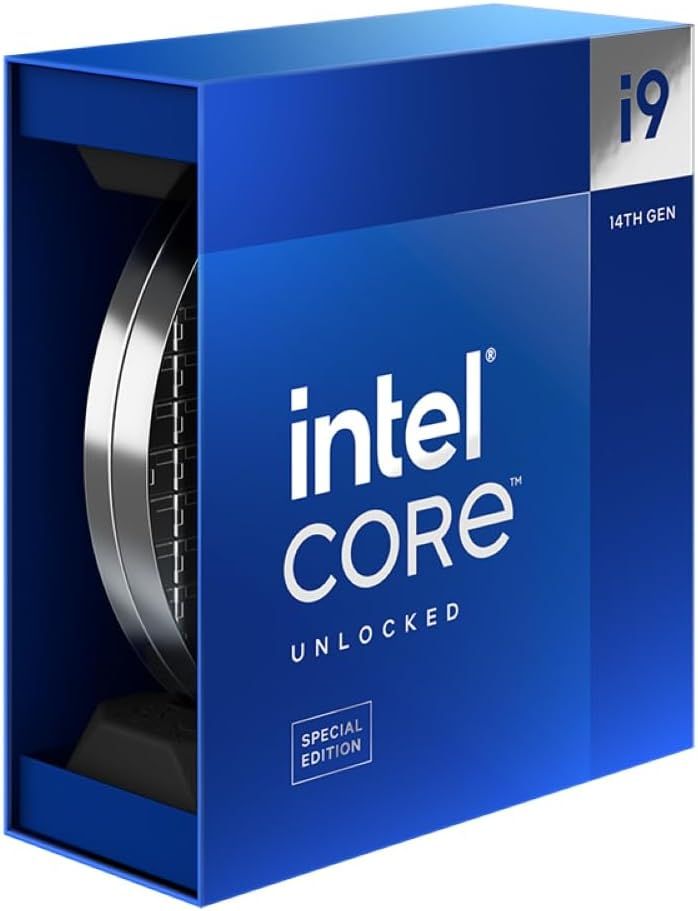
Intel Core i9 14900KS 24-Core, 32-Thread CPU
Top CPU for High-Performance TasksIntel’s Handpicked Powerhouse
The Intel Core i9 14900KS, a 24-core, 32-thread CPU, is Intel’s special edition take on its flagship 14th generation CPU, the Core i9 14900K.
This CPU is essentially a handpicked 14900K model that can push higher clock speeds, reaching a minimum of 6.2 GHz on its P-Cores. This makes it the highest-clocked CPU out of the box to date in terms of boost clocks from Intel.
Due to its premium features, it trades at a significant premium and is expected to be a collectible SKU with high demand from enthusiasts and overclockers in 2024.
- Brand
- Intel
- CPU Model
- Core i9 14900KS
- CPU Socket
- LGA 1700
- Cores
- 24 Cores (8 P-Cores + 16 E-Cores)
- Threads
- 32 Threads
- Architecture
- Raptor Lake Refresh
- Process
- Intel 7
- Base Clock Speed
- 3.2 GHz (2.4 GHz E-Cores)
- Boost Clock Speed
- 6.2 GHz (4.5 GHz E-Cores)
- Cache
- 36 MB L3, 32 MB L2 Cache
- TDP
- 150 Base TDP
- PCIe
- PCI-E 4.0 and 5.0 Support
- Graphics
- Intel® UHD Graphics 770
- PCIe 4.0 Support
- Yes
- Transistors
- Unstated
- Power Draw
- 253 W
Advantages- Boasts the highest single-core clocks and performance for a CPU in 2024
- Provides a massive 32 threads across 24 cores
- One of the fastest CPUs for both gaming and productivity
- Compatible with existing Intel LGA 1700 motherboards
- Can utilize Intel’s APO optimizations for enhanced performance
- Can be AI tweaked/overclocked using Intel’s XTU utility by users
Disadvantages- Trades at a significant sub $100 premium over the 14900K
- Requires substantial power draw to achieve its advertised performance
- Requires top-tier desktop-class AIOs to function as intended
See at Amazon$664 at NeweggFor those seeking the most potent Intel CPU available, the Intel Core i9 14900KS, a silicon lottery version of the Core i9 14900K, appears to be the perfect fit. The Intel Core i9 14900KS 24-Core, 32-Thread CPU builds on the 14900K’s capabilities with even higher boost clocks on both its performance and efficient cores. This cherry-picked version is almost guaranteed to meet the demands of overclockers and tweakers better on average.
The impressive 6.2GHz single-core boost clocks, along with the substantial core and thread count, make the 14900KS one of the best options for power users and gamers. This is further enhanced by Intel’s AI-assisted overclocking toolkit as part of its XTU platform and its APO optimizations in games and applications.
However, the 14900KS is a powerful but high-maintenance CPU in 2024 due to its significant power requirements and the need for a robust AIO cooler to maintain temperatures, especially under load. Additionally, the sub-$100 premium over its capable alternative, the Intel Core i9 14900K, may deter some users, making the 14900K a more value-centric alternative to Intel’s fastest consumer-grade CPU at the time of writing.
As part of an ongoing promotion, the Intel Core i9 14900KS and the more mainstream 14900K are currently included in a set of qualifying Intel 14th-generation CPUs that come with a free copy of Star Wars Outlaws at launch.
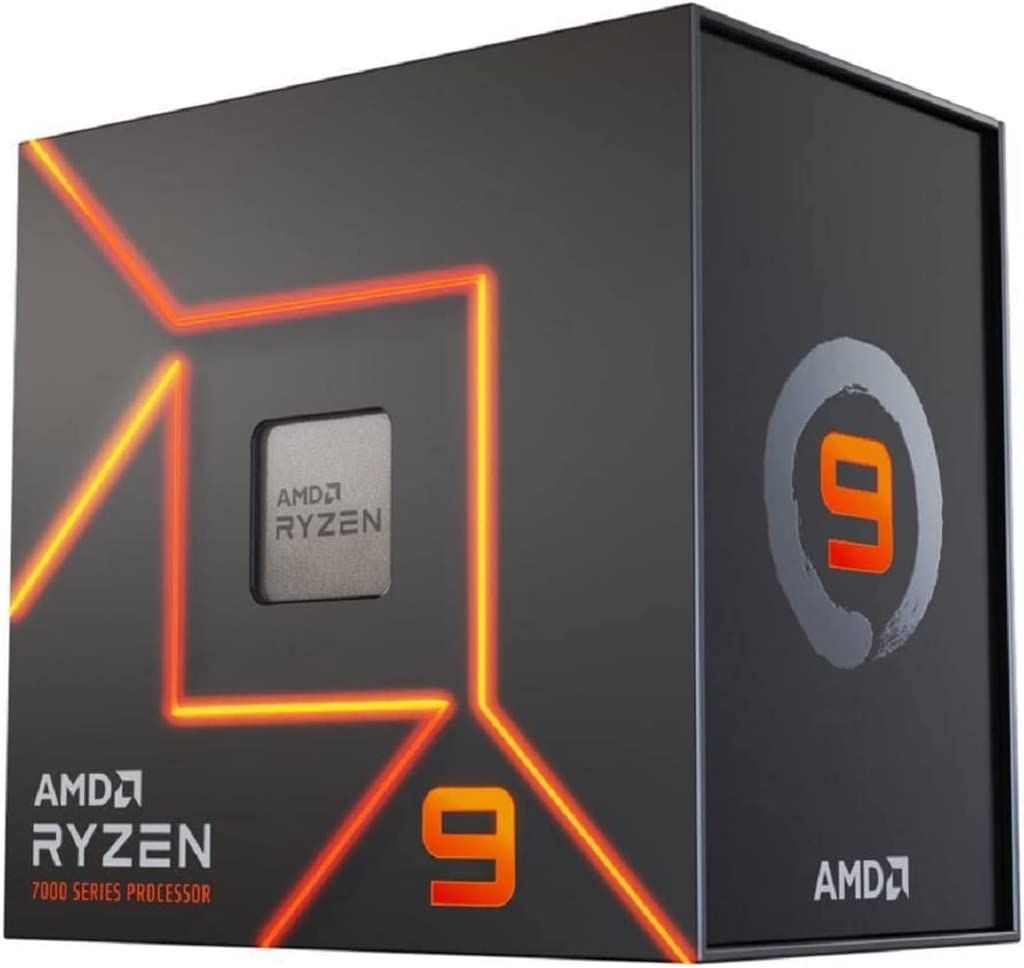
AMD Ryzen™ 9 7950X 16-Core, 32-Thread Unlocked Desktop Processor
Top Alternative CPU for Productivity Tasks16-Core Performance Powerhouse
$549 $608 Save $59 The AMD Ryzen 9 7950X is the leading processor in AMD’s Ryzen 7000 series. It can reach up to 5.7Ghz and offers unparalleled efficiency, claiming the title for the best multi-threading performance for a 16-core processor.
- Socket
- AMD AM5
- Brand
- AMD
- TDP
- 170W
- Cores
- 16
- Threads
- 32
- iGPU
- Yes, RDNA2
- L3 Cache
- 64MB
- Base Clock
- 4.5Ghz
- Boost Clock
- 5.7Ghz
Pros- Provides competitive productivity to 14900K at a reduced cost
- Supports excellent overclocking capabilities
- Demands less powerful cooling than its rivals
- More efficient than competitors for productivity tasks
Cons- Not among the top CPUs for gaming
- Some competitors offer slightly superior multi-core performance for specific tasks
See at Amazon$549 at Newegg$550 at Best BuyIf a user’s primary focus isn’t gaming, the AMD Ryzen 9 7950X emerges as a superior choice that outperforms even its pricier counterpart, the Ryzen 7950X3D. This is due to the latter’s overclocking and higher boost clock speed limitations resulting from its die design, unlike the 7950X which supports significantly higher boost clock speeds and overclocking.
The Ryzen 9 7950X boasts the highest boost clocks for an AMD processor to date, allowing it to claim the performance crown for workload-based tasks. This replaces AMD’s previous 16-core offering, the Ryzen 9 5950X. It provides more performance while trading at a reasonable discount over its launch MSRP, even as the 7950X3D takes the top spot for consumer-grade processors, offering slightly better efficiency and significantly superior gaming performance.
At its core, the Ryzen 9 7950X is a highly competent 16-core, 32-thread processor. It also benefits from the latest advancements that come as part of its tech offerings as it adopts the AM5 platform: PCI-Express 5.0 and DDR5 memory support. It is also much more efficient than the competing Intel Core i9 14900K in terms of multithreaded performance and offers lower power draw even when idle.
Despite facing renewed competition from a price-adjusted Intel Core i9 14900K and a deeper discount on the Ryzen 9 7950X3D, it still manages to hold its own in terms of efficiency against the former and better productivity performance against the latter due to more flexibility in terms of clock speeds.
The Intel Core i3-14100F: A Solid Choice for Entry-Level Gaming
In the world of Central Processing Units (CPUs), the competition between Intel and Advanced Micro Devices (AMD) is fierce. Both companies offer a range of processors that cater to different user needs, from casual computing to high-end gaming. However, if you’re looking for a reliable entry-level CPU for gaming, the Intel Core i3-14100F is a strong contender.

The Intel Core i3-14100F is a revamped version of the i3 13100F, boasting higher clock speeds that reach up to 4.7 GHz. It’s based on Intel’s older Alder Lake architecture, which has been rebranded as a Raptor Lake Refresh offering. This CPU features 4 performance cores and a total of 8 threads, making it suitable for small to medium-scale applications. Its impressive single-core performance allows it to compete with most entry-level processors in both gaming and productivity tasks.
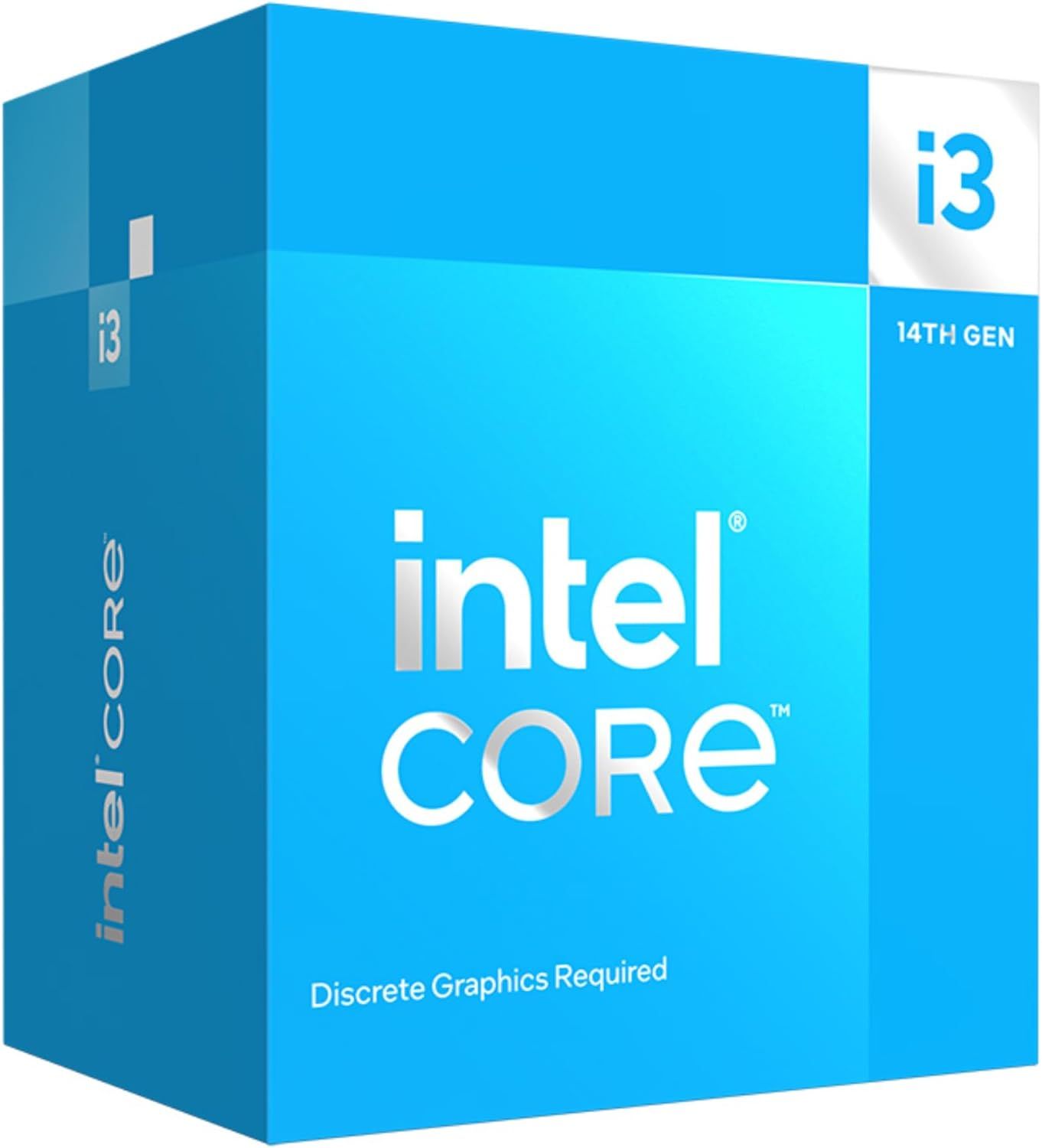
The Intel Core i3-14100F is compatible with older LGA 1700 platforms from Intel, provided a BIOS update is performed. It offers better single-core performance than competing entry-level AMD CPUs and has an upgrade path to higher-end CPUs on the same socket. The CPU comes with a stock cooler as part of the package, which is a bonus for budget-conscious users.
However, it’s worth noting that a 4-core 8-thread configuration CPU in 2024 does have its limitations. Additionally, the i3-14100F does not offer an integrated GPU (iGPU), which could be a drawback for budget users.
Despite these limitations, the Intel Core i3-14100F remains a formidable choice for entry-level gaming. Its robust performance and affordable price point make it a great option for gamers on a budget.
The 4-core, 8-thread Intel Core i3-14100F CPU delivers a solid performance, leveraging Intel’s older Alder Lake silicon in a repurposed, higher-clocked CPU. This essentially makes it a higher-clocked 12100F or 13100F. The added performance that the 200 MHz and 400 MHz boost clock gains offer is particularly beneficial in games, where single-core performance is a crucial factor for most users.
In conclusion, if you’re in the market for an affordable, reliable, and performance-oriented CPU for entry-level gaming, the Intel Core i3-14100F is worth considering.
Exploring the Core i3 14100F: A Cost-Effective Choice for Gamers
The Core i3 14100F is a unique offering from Intel that eliminates the integrated GPU (iGPU) found in the Core i3 14100. This decision results in a more affordable product, allowing you to allocate the savings towards a superior discrete GPU (dGPU) when assembling a gaming PC. Given that the integrated option in the latter CPU struggles with most modern games, the cost reduction is beneficial both in terms of reduced thermal load on the chip and the financial savings for the consumer.
Performance and Upgrade Options
Intel’s Core i3 14100F comes with a standard Intel cooler, which means users can save on a dedicated cooler for the locked CPU. However, the performance limitations of a 4-core, 8-thread CPU might not impress users in 2024. Fortunately, there are numerous upgrade options available in Alder Lake (12th gen), Rocket Lake (13th gen), and Rocket Lake Refresh (14th gen) for users planning to upgrade in the near future.
Introducing the AMD Ryzen 5 7600X: A Budget-Friendly Gaming CPU
The AMD Ryzen 5 7600X is a remarkable hexacore CPU for gaming that represents AMD’s mid-range strategy for a gaming processor. It offers overclocking capabilities, decent gaming performance, and superior efficiency in a package priced under $200. This CPU allows users to experience the AM5 platform without a hefty investment, making it an excellent, balanced offering from Team Red for budget-conscious upgraders.
Efficiency and Integrated Graphics
While AMD’s offering is somewhat restricted in terms of core count due to its hexacore design, it provides significantly more flexibility in terms of efficiency, even if it falls short in production workloads. The 7600X also includes a basic 2-core integrated Radeon graphics, enabling users to use it for productivity tasks without requiring a separate display option, unlike its AM4-based predecessor that needed a discrete solution.
Final Thoughts
In conclusion, if you’re considering AMD and are on a budget, the 7600X is a solid choice. It delivers an efficient, gaming-focused performance that doesn’t strain your wallet while offering substantial value to the end user.
AMD Ryzen 5 7600X: A Gaming Powerhouse
The AMD Ryzen 5 7600X is a formidable contender against Intel’s core-rich i5 14400 and 14500 CPUs. While Intel’s offerings may outperform the 7600X in productivity tasks, the AMD chip takes the lead in gaming performance. The Ryzen 5 7600X delivers on its promise of a speedy hexacore CPU, providing an efficient, gaming-focused AM5-based alternative for gamers considering an AMD build.
Price and Upgrade Path
The price of the AMD Ryzen 5 7600 typically fluctuates between $200 and $250, but it’s often found closer to the lower end of that range. This makes it an appealing choice for gamers, especially considering its upgrade path. Unlike its Intel counterparts, which are expected to end with the 14th generation on the LGA 1700 platform, the AM5 platform of the Ryzen 5 7600 has several more years of potential upgrades ahead.
Intel Core i7-12700K: A Productivity Champion
Despite its age, the Intel Core i7 12700K CPU remains a strong contender, especially in light of Intel’s recent price reductions on the Alder Lake series. Unlike the comparable Core i5 13500 CPU, the 12700K comes overclocked right out of the box. It also boasts two additional performance cores (P-cores), albeit with four fewer efficient cores (E-cores).
Conclusion
Both the AMD Ryzen 5 7600X and the Intel Core i7 12700K offer compelling options for gamers and productivity users alike. The choice between the two will largely depend on your specific needs and budget. If gaming is your primary concern, the Ryzen 5 7600X’s superior performance and upgrade path make it a strong contender. However, if productivity tasks are more important to you, the Core i7 12700K’s additional cores and overclocking capabilities may tip the scales in its favor.
Understanding the Value of Alder Lake CPUs
The Alder Lake CPU, with its impressive gaming and productivity performance, overclocking potential, and reasonable price, was a popular choice at its launch. Its compatibility with both Intel’s 12th and 13th generation motherboards, as well as DDR4 and DDR5 memory depending on the motherboard selected, makes it a versatile and well-rounded option to consider.
Performance Comparison: i7 12700K vs Core i5 13600KF
The i7 12700K, with its 8 performance and 6 efficient core configuration, totaling 20 threads, is no underperformer in most productivity-focused tasks. However, it faces stiff competition from the Core i5 13600KF, which boasts faster cores and superior gaming performance. Consequently, Intel offers a significant price reduction for the 13600KF, which, despite its sub-$250 price tag, outperforms in various applications and games due to its higher IPC count, more cache, and slightly higher boost clock speeds.
Related: Optimal CPUs to Pair With an RTX 4090
The Nvidia RTX 4090 is currently the most potent consumer-grade GPU on the market. To maximize its performance, it’s crucial to pair it with the best CPUs available.
Introducing the AMD Ryzen 7 8700G 8-Core, 16-Thread CPU
The AMD Ryzen 7 8700G 8-Core, 16-Thread CPU is a robust APU that provides modest gaming performance for PCs that do not currently use a discrete GPU. It utilizes the fastest iGPU solution currently available to consumers. It comes with a stock cooler, an octa-core CPU configuration, and a rated TDP of 65W, making it a cost-effective alternative to many budget CPU and GPU combinations currently on the market. The AMD Ryzen 7 8700G is also one of AMD’s first desktop CPUs to include the AMD Ryzen AI engine built into the chip.
Key Specifications of the AMD Ryzen 7 8700G
The AMD Ryzen 7 8700G boasts impressive specifications, including an AMD Socket AM5, 8 cores, and 16 threads. It supports PCIe 4.0 with 20 lanes (8 usable by GPU), has a base clock speed of 4.2 GHz, and a boost clock speed of 5.1 GHz. It also features an L2 Cache of 8MB and an L3 Cache of 16MB. With a TDP of 65W and an AMD Radeon 780M (12 CU) 2900 MHz iGPU, it’s built on the AMD Zen 4 architecture and the TSMC 4nm process.
Advantages- Delivers superior entry-level gaming performance compared to its predecessor
- More efficient than its direct CPU + discrete competitors
- Includes a robust stock cooler in the package
- Features top-notch current-gen Zen 4 cores in an eight-core configuration
- Provides an unlocked CPU and GPU for overclocking enthusiasts
Disadvantages- The PCI-E x8 limitation for future GPU upgrades may not be seen as a good tradeoff by some users
- Delivers lower CPU boost clocks than other eight-core AMD CPUs
Available on Amazon$329 at Best Buy$329 at Newegg
The AMD Ryzen 7 8700G is equipped with the latest Zen 4 cores in an 8-core, 16-thread configuration. It pairs these with a 12 CU RDNA 3 GPU that operates at a high 2.9GHz clock speed on-die, while the APU targets a 65W TDP that AMD promises to cool with an included Wraith Spire cooler. Currently, it is the CPU with the fastest integrated graphics, making it an attractive choice for budget gamers, SFF builders, and users seeking a capable HTPC without overspending.
The AMD Ryzen 7 8700G utilizes the AMD Radeon™ 780M mobile GPU to deliver excellent entry-level FHD gaming performance. It also supports future upgrades by adopting the AM5 socket, which is expected to offer more options in the future. However, it does require fast DDR5 RAM, ideally clocked at 6400 MHz or higher, to unlock its GPU performance. It also features a dedicated Ryzen AI upgrade, making it one of the first desktop-class CPUs with the Ryzen 8000 label.
Some users may be disappointed to learn that it is limited to PCI-E 4.0 speeds and offers reduced x8 bandwidth for discrete GPUs, which could limit some high-end GPU upgrade options in the future. The iGPU’s strong reliance on higher-clocked RAM for better performance can be mitigated to a large extent, but it does add a layer of complexity that most tweakers (but not entry-level users) would appreciate.
Recommendation: For a more comprehensive understanding of why the Ryzen 7 8700G is the most powerful APU available in 2024, consider reading Game Rant’s review of the AMD Ryzen 7 8700G APU. For those on a tighter budget, the AMD Ryzen 5 8600G might be a better option. Game Rant also offers a dedicated guide for the recently released value-centric APU for gamers who are undecided about opting for an APU this generation.
The Significance of Single-Core CPU Performance in Gaming
Single-core performance is often highlighted as a crucial factor in determining a CPU’s performance potential. This is due to the way video games typically operate, with older video game engines primarily being single-threaded or not distributing most of their logic across multiple threads. Even modern video games tend to rely heavily on a single thread, reinforcing this concept.
Indeed, faster single-core performance often results in significant performance improvements for most modern titles. This is because a faster single-core can reduce the performance bottleneck that game engines experience when threads ‘wait’ on the primary thread to proceed before they can move to the next frame or render more objects. Consequently, faster single-core performance can reduce resource ‘locks’ on a processor. However, this is not the whole picture.
Modern games are increasingly designed to take advantage of the additional power that multicore CPUs provide. This is because multicore CPUs can handle multiple tasks simultaneously, resulting in smoother gameplay and better overall performance. However, it’s important to note that not all games are optimized for multicore CPUs, and some may still rely heavily on single-core performance.
Understanding the Factors Influencing Multicore CPU Performance
The performance of multicore CPUs is influenced by a variety of elements. However, these can be simplified into three primary factors:
1. Enhanced Game Consoles
Game consoles have significantly evolved over the years, becoming more powerful with each new generation. Both Sony and Microsoft have opted for custom AMD x86 chips in their latest consoles, with the current generation using custom AMD Zen 2-based APUs. This has led to a shift in target platform development towards an octa-core processor. As a result, modern games are now able to better utilize the limited resources on consoles, leading to improved performance on both game consoles and PCs.
2. Advanced Game Engines
Game engines have also seen considerable advancements, offering developers more control and powerful optimization techniques. This has resulted in better gaming performance on multicore CPUs, which were previously underutilized.
3. Increased Core Counts in Entry-Level CPUs
Another significant factor is the higher core counts in entry-level CPUs from Intel and AMD. Most of these CPUs offer a minimum of 4 cores, with many providing 6 or more. This allows developers to design their games with a larger core count in mind from the outset, leading to increased optimization of multicore CPUs.
The Growing Relevance of Multicore Performance
While multicore performance has traditionally been a secondary factor to performance, it has become increasingly important since the turn of the century. As new titles continue to be released, the relevance of multicore performance will only continue to grow. Single-core performance can be seen as the maximum potential a CPU can exhibit in modern games that meet their multicore requirements, making it a crucial benchmark for most modern games.
That’s why companies like Intel and AMD focus on single-core performance for gaming-centric CPU offerings. Higher clocks are offered at the higher, multicore CPU tiers, which are typically reserved for enthusiast-tier gamers and creators. An example of this is the Intel Core i9 14900K.
Final Thoughts
It’s important to note that more cores and higher clocks don’t always equate to more performance. For instance, the AMD Ryzen 9 7950X, a 16-core processor, has a smaller productivity workload gap with the Core i9 14900KS than raw core counts would suggest. However, the current gaming champion is the AMD Ryzen 7 7800X3D, which outperforms all of its competition thanks to its 3D V-Cache implementation.
For those seeking the best value for money, both Intel’s Core i5 and AMD’s Ryzen 5 offer an excellent price-to-performance ratio. For those seeking the best of the best, the AMD’s Ryzen 9 7950X and Intel’s Core i9 14900K are excellent options. Despite being an octa-core processor, the Ryzen 7 7800X3D stands out as the best gaming CPU available in a segment that has plenty of cores to offer for high-end processors.
Common Queries
Q: Which is the quickest CPU for gaming?
At present, the AMD Ryzen 7 7800X3D holds the title for the fastest gaming CPU. It boasts an eight-core configuration and is supported by AMD’s 3D V-Cache. The AMD Ryzen 9 7950X3D and Intel’s Core i9 13900KS are not far behind, securing the second and third positions respectively.
Q: Which is the Speediest AMD CPU for Work-Related Tasks?
When it comes to productivity, the Ryzen 9 7950X from AMD is the fastest consumer-grade CPU. It has a 16-core, 32-thread configuration and outperforms its pricier counterpart, the Ryzen 9 7950X3D, in most productivity benchmarks. This is due to its superior clock speed and TDP rating, which enhance its performance in non-gaming benchmarks.
Q: Which is the Optimal CPU for Work-Related Tasks?
As of September 2023, the Intel Core i9-14900KS is the leading CPU for work-related tasks. It can reach 6000MHz on single-core clocks and has 24 cores that manage 32 threads. This allows it to outperform most of its competitors in number-crunching tasks.